- Home
- James A. Michener
Journey: A Novel Page 2
Journey: A Novel Read online
Page 2
‘He told me to say hello,’ Philip replied. ‘Said he wished he could join us.’
‘In this Klondike business? He’d better stay home and mind the shop.’
‘No, he meant for dinner tonight.’
After a congenial meal, at which they discussed only county cricket, they wandered into the smoking room, where Harry said: ‘I’ve brought something you both must read, that is, if we’re going to pursue this gold foolishness,’ and he passed along a worthy book published in London in 1868. It was by the English explorer Frederick Whymper, Travel and Adventure in the Territory of Alaska, and it recounted in delightful style his fifteen-month trip to that region in 1866.
But after Luton had given the book only a cursory glance he shoved it back: ‘Harry, the man was never in Canadian territory. Our plan must be to move only through Canada.’
Before he could elaborate on the patriotic impulses that such a statement inspired, a white-haired club attendant came to suggest that since four members playing whist had protested the racket being made by Carpenter’s rumbling voice, would the gentlemen please move to another room. Both Luton and Carpenter bowed politely to the servant, then to the whist players, and retired.
‘Now, what we would do, assuming that I joined you,’ Harry said as if there had been no rejection of his book, ‘is hie ourselves to San Francisco by one of the railroads they say they have, then catch a ship to Petropavlovsk in Siberia and take some Russian steamer across the Bering Sea to the mouth of the Yukon, and up we go to this place called Dawson City, wherever it is. It’s certainly not on this map.’
Lord Luton managed an icy laugh: ‘Harry, Whymper made his trip more than thirty years ago. If we wanted to go that route, we could take a train right out to this place called Seattle and then find us a big, comfortable oceangoing steamer straight to Alaska.’
‘Oh.’
‘But the whole purpose of our trip would be to make it exclusively on Empire terrain. Land in Montreal, go by train across Canada to a place whose name escapes me, go up one of the Canadian rivers, perhaps the Mackenzie, cross the Rockies, and drift easily down to the gold fields. Simple.’
‘Can it be done?’
‘Join me in the morning. We’ll visit the Canadian offices. They must have the information.’
And as the summer evening passed, with fine cigars and ancient cognac, Philip listened intently while Luton and Carpenter reviewed the reasons why entering the Klondike by an all-Empire route was not only an act of patriotism but also a most appropriate act for a son of the Marquess of Deal: ‘Have you ever read, Harry, how my grandfather, the seventh marquess, was so badly treated by the Americans in that Oregon nonsense years ago? The braggarts changed the jingle “Fifty-four-forty or Fight,” and my grandfather, who was in charge of negotiations for the English, said in this very club: “Very well, if the scoundrels want a fight, let’s give it them,” and he was prepared to lead volunteers into Canada, from which base he was ready to invade New York and Washington.’
‘What did the Americans do to humiliate him?’
‘That’s the proper word, humiliate. In the middle of the proceedings, with war inevitable, they called the whole thing off, surrendered their silly claim to what would have been half of Canada, and made my grandfather look rather foolish. Of course he was rather foolish, as you know, but he didn’t like to be exposed.’
‘What happened?’ Philip asked, and Luton said: ‘Nothing. It’s sometimes advantageous when nothing happens.’ But then he tightened his lips and added: ‘It did leave our family with an abiding distaste for what our relatives called their “ungrateful American colony.” Even today the Bradcombes try to avoid Americans.’
However, he could not help laughing at himself as he revealed one of the trivial reasons why he was personally impatient with Americans: ‘Anytime I meet one of them I have to explain my name. To them Evelyn can be only a girl’s name, three syllables, rather 1840, you know. I have to tell them that in civilized lands it’s an honored man’s name, two syllables, first one to rhyme with peeve or leave. I have sometimes thought that I would punch the next American who asks me about it.’
In the morning Harry Carpenter stopped by to pick up young Philip Henslow after paying his respects to the boy’s father. They proceeded to the club where Lord Luton was staying and then drove to the London offices of the Canadian government, where a commercial attaché awaited them. Taking them to his cluttered office, he sat them before a large wall map containing names with which he was familiar and they were not.
‘Of course, we’ve known for years about scattered gold in these regions up here, but this Klondike thing is rather special, isn’t it?’ When Luton nodded, the attaché said disparagingly: ‘Since these lurid American newspaper stories, we’ve been so deluged with inquiries that Ottawa has had to cable us two pages of reliable information, which I’ll pass along later. But for gentlemen of your standing, I must say our government would be most honored to receive you … well, I should think you ought to see a special cable which arrived only yesterday.’
‘We would profit from any information,’ Luton said, whereupon the attaché almost fell over himself to be gracious: ‘Could I have Miss Waterson fetch you some tea? Good.’
With a pointer he reviewed what he called the ‘rather simple problem of getting from London to Edmonton.’
‘And why Edmonton?’ Carpenter asked, and Luton interrupted: ‘That’s the name I was trying to remember!’
‘Your commodious Canadian steamer will disembark you at Montreal, a port equal in every way to New York, where the fast trains of the Canadian Pacific will carry you to Ottawa, Fort William and Winnipeg. Miss Waterson is from Winnipeg, and she can assure you it’s a splendid stopover for a short rest before heading into the gold country.’
Miss Waterson did so assure them.
‘And now we come to the exciting part of our trip, the journey through the vast lands of the Northwest Territories. Winnipeg across our District of Saskatchewan …’
‘What glorious names!’ Philip Henslow cried, and the attaché nodded: ‘They are indeed. Indian, too. And then west to Calgary, from which a spur runs north to Edmonton, the end of the railway and the beginning of your great adventure.’
‘Where’s Dawson City?’ Luton asked, and the Canadian said: ‘Well, sir, it’s not on the maps yet. It sprang up last year, overnight as it were.’
‘But where is it?’
The attaché explained: ‘I have a recent letter from Ottawa which sketches the new developments, and it places Dawson right about here,’ and he entered a dot on the map, siting it about a hundred and fifty miles nearer Edmonton than reality would justify.
‘So you see, gentlemen, when you leave the train in Edmonton you’re practically in the gold fields.’
‘What gear should we take?’ Carpenter asked, for when frontiers were involved he had a practical mind.
‘Oh, sir! Only your traveling kit. One bag, two bags. Because everything you could possibly need in the gold fields can be purchased in Edmonton, and at prices considerably less than those being charged in the United States, where, if the truth be known, they’re apt to prey upon the traveler.’ Luton said, as if making his goodbyes: ‘I can believe that,’ but the young man had one more important caution: ‘Milord, you really must get one fact burned into your mind, because a great deal depends upon your understanding of it. Here in England it’s July, glorious time of the summer, boating and croquet. But in northern Canada it’s almost the beginning of winter. If you’re going, go soon and go fast, because our northern winters can be terribly deep and tediously long.’
Luton nodded, but Carpenter felt that anyone with a respect for geography and good sense would know what the young man had just said; he was impatient to get down to business: ‘What was the cabled information you spoke of?’ and the attaché produced two extremely reassuring typed documents. The first had been issued by undesignated officials within the Edmonton Board of Trade, and it
promised the traveler from Europe that the only sensible way for him or her to reach the gold fields was through Edmonton:
It is more direct, less tiring and cheaper. You have seen pictures of the dreaded Chilkoot Pass, which only the bravest and strongest can negotiate. Avoid it if you can. The ocean route to St. Michael is tedious and expensive, and when you get there you still have to move upstream along practically the entire length of the Yukon River.
Come to Edmonton. Use the all-Canadian route. And find yourself at the gateway to the gold you seek. From Edmonton you will have the choice of four easy routes which will be outlined to you by local experts, who will also provide you with guidebooks and maps. Come to Edmonton and make yourself a millionaire.
Both Luton and Carpenter dismissed this as an understandable effort by the merchants of a provincial city to lure business their way, but they were quite impressed by the cable which had arrived the day previous, for it summarized the reasoned views of two experienced travelers who had made the journey from Edmonton to Dawson and who assured prospective adventurers that the trip was not only practical but in certain respects pleasant. The first expert was a man named Ludwig Halverson, who told how one could come to Edmonton, head over an easy trail to the Peace River, cross a low divide, pick up the Liard River, move quickly to the Pelly, and drift comfortably down to a confluence with the Yukon, from which the gold fields would be only a few more miles, all downstream:
This route will prove both the easiest and quickest to the target. Any well-trained man with a good packhorse and a light canoe should be able to cover the pleasant distances in less than seven weeks, and the vigorous experience of sleeping in the open and breathing the world’s freshest air will prepare him for the easy work of panning for gold.
Halverson provided the prospector with various useful hints. One must not buy inferior equipment but wait till one reached Edmonton, where men long trained in frontier living would know what was best for travel in the north. Scurvy, which used to be a problem, was easily prevented by a proper diet, which local grocers would be happy to provide. When one found a rich placer deposit, one should have the gold assayed as promptly as possible and reduced to bricks for easier carriage. In fact, Halverson used the word easy so often that it became a kind of refrain, but the substance of his article was that by leaving from Edmonton and choosing one of the easy river routes to Dawson, the prospector would reach the fields much sooner than those who went by the American routes. He would thus be in a position to stake the best claims.
Harry Carpenter, well versed in the difficulties of travel in harsh places, knew intuitively that the trip might require somewhat more than seven weeks, but since he did not trace out the distance on the map, he visualized a trip not of twelve hundred miles but of something like four hundred. He said frankly that he, for one, would be more interested in the other major route, the one that was downstream most of the way, the one that focused on one of the great scarce-explored rivers of the world, the Mackenzie. It was a perplexing waterway, because it bore many different names—Finlay, Peace, Slave—a result of the fact that at different dates it had been discovered piecemeal and always from the warm south, but always it was the same great river, two thousand, six hundred miles in length from its birth in high mountains near Alaska to its entry into the arctic seas. It was a river to inspire the imagination of men, and Carpenter wanted to test it.
An explorer who had traveled it in both directions, Etienne Desbordays, explained in the second half of his report how efficient and awe-inspiring and, yes, even delightful the trip down the Mackenzie could be:
Wild animals in great profusion feed along the riverbanks as your boat or canoe glides past. Tall mountains grace the distance, and every turn in the river provides some new excitement, for you are traveling through some of the wildest and most beautiful land in North America.
Swiftly, silently the vast river carries you to your destination, and after a thousand miles of this effortless travel you approach the Beaufort Sea, an arm of the Arctic Ocean, but you are not headed there. Choosing any one of a dozen convenient rivers which feed into the Mackenzie from the west, you head west along the pleasant waterways, cross a low divide, and find yourself in the headwaters of the Klondike River itself, down which you drift, pausing to prospect at likely sites as you go.
Desbordays concluded that there could not be a more pleasant or effective way to reach the gold fields than to follow the Mackenzie. ‘And one of the glories of this route is that it is entirely Canadian. You pay no United States duties on your necessities when you come this way. You are on Canadian terrain all the way.’ As with the other route, there were a few facts of which he must have been aware but which in the service of salesmanship he chose to disregard.
The Canadian office in London was so pleased with the specific data provided by this long cable that steps had already been taken to publish it as an instructive pamphlet with maps and quotations from earlier correspondence, for as the attaché reminded Lord Luton: ‘You must remember, we’ve known about gold in Canada for the past six years. It’s just that this latest strike has gotten a little out of hand.’
‘Who are these Halverson and Desbordays?’ Carpenter asked the attaché, who in turn asked Miss Waterson if she knew of them. When she replied: ‘I’m from Winnipeg. That’s more than six hundred miles from Edmonton,’ the Englishmen caught some sense of the vast distances involved. Young Philip, good at math as well as classics, studied the wall map for some moments, then said: ‘You know, Uncle Evelyn, Edmonton to Dawson is a long way, a very long way,’ but the impact of his discovery was blunted by the attaché, who said enthusiastically: ‘Evelyn. That’s a fine English name we rarely hear in Canada,’ and the conversation turned to other matters.
It was decided that Lord Luton’s team would be comprised of himself, his cousin Harry Carpenter, his nephew Philip Henslow and an adventurous friend of Philip’s, an Oxford man of twenty-two named Trevor Blythe whose frail build and sensitive manner belied his courage and tenacity. These four would form an admirable team; two older men of mature judgment and great force supported by two younger gentlemen who had done well in school and who promised to do just as well in life. All four were resourceful, educated, and representative of the best that their exalted class could produce. On the night that they met together at Luton’s club for the first time, Luton had said with reserved pleasure: ‘I say, if any four in this city stand a chance to fight their way to the gold fields, it would be us.’ He saw his team as the next group of highly disciplined Englishmen to follow in the steps of the great explorers, who had all had backgrounds like theirs: a distant boarding school at age seven, knocked pillar to post by older boys at Eton or Harrow, rollicking through their university days at Oxford or Cambridge, serving in the army or navy when required, and on to a gallant life. The four were terribly able but also terribly deceptive; when you saw them move out as a group they might be headed insouciantly either for an afternoon’s punting on the Thames or to a nine-month probe of the headwaters of the Amazon.
That night Lord Luton started the next installment of the journal he had kept on all his explorations against the day when he might want to write of his adventures:
I doubt I could have put together a more trustworthy foursome: two grizzled veterans like Harry and me, and two stalwart young fellows just beginning to show their mettle, Philip and his friend Blythe. We understand the responsibilities of being Englishmen and I trust we shall conduct ourselves according to the highest traditions of that calling.
But it was clear both to Luton and Carpenter that a fifth man was needed, someone to do the heavy manual work, and it was fortunate that one of the country places pertaining to the Marquess of Deal was located in Northern Ireland, where Lord Luton had spent many of his summers. During his visits to the area where his father had lived before he inherited the marquisate, and where the old man had developed his distrust of Catholics, Evelyn had come to know rather well a fellow two years you
nger than himself who displayed a spirit and an ability that anyone would have respected. Timothy Fogarty was the son of poor farmers whose land had been absorbed generations ago when Queen Elizabeth moved Scottish crofters and English lords across the Irish Sea ‘to civilize,’ as she said, ‘the people of that unfortunate island.’
An early Marquess of Deal had been one of her agents in this effort at altering the character of a land, and he had been a holy terror, rooting out priests and establishing in their stead reliable Protestant ministers. Subsequent members of the Brad combe family bad been more conciliatory, but all had one propensity: they lived in Ireland as long as they bore the subsidiary title Lord Luton, but once they inherited the marquisate, they moved promptly to one of their several senior estates in England and rarely saw Ireland again.
The present Lord Luton, who stood no chance of inheriting the marquisate, was not at all like that; he liked Ireland, its gentle ways and lyrical manner; in particular he liked what he had seen of Fogarty. From the brash young lad’s first days on the Luton properties he had displayed such an innate understanding of animals and fish that Evelyn had quickly designated him an apprentice to the elderly Irish gamekeeper who minded the wildlife on the estates. He proved exceptionally qualified to be a ghillie, the Scottish term that Luton used for his field helpers, and in addition, he was well-mannered and could sing like the paid choristers in a London church. He was big of chest, but not overly tall, and when he applied himself to a task he could do prodigious amounts of work. He had only a sparse education, which he fortified with common sense, and if a group of traveling Englishmen with money wanted a factotum, they could find no one better suited to this task than Tim Fogarty. Married to a responsible lass named Jenny, he was nevertheless always eager for a new challenge, and since he had the native intelligence to attack it in a new way, he was almost ideal for the job Lord Luton had in mind. However, he did have one weakness about which the noble lord did not know: Tim Fogarty, though in training to become a traditional Irish gamekeeper, was one of the canniest poachers in Ireland. No trout stream was safe from his attentions, and even those he was hired to protect fell prey to his nighttime explorations, for he was a master of the shaded light, the well-cast line. He did not consider his poaching criminal in any respect, for as he confided to his priest: ‘A man cannot love horses and roses and prize hogs unless he also loves fish … and I do love them.’

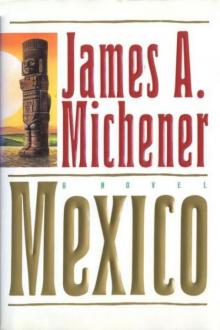 Mexico
Mexico The World Is My Home: A Memoir
The World Is My Home: A Memoir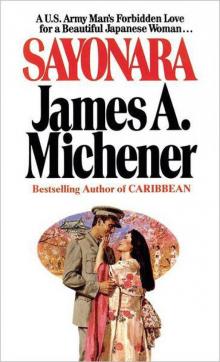 Sayonara
Sayonara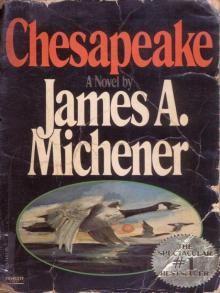 Chesapeake
Chesapeake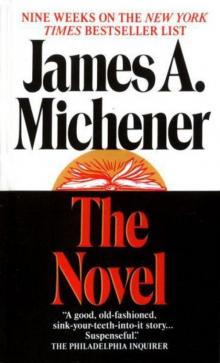 The Novel
The Novel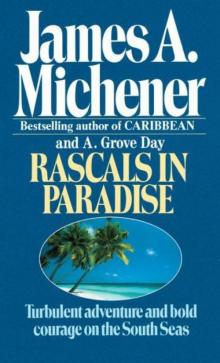 Rascals in Paradise
Rascals in Paradise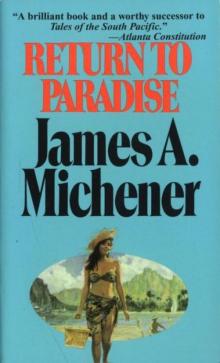 Return to Paradise
Return to Paradise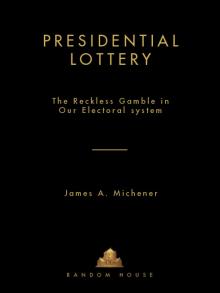 Presidential Lottery: The Reckless Gamble in Our Electoral System
Presidential Lottery: The Reckless Gamble in Our Electoral System The Source
The Source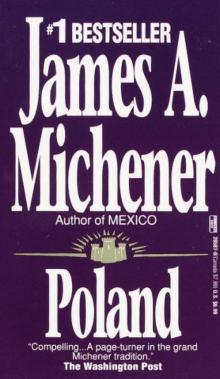 Poland
Poland Space
Space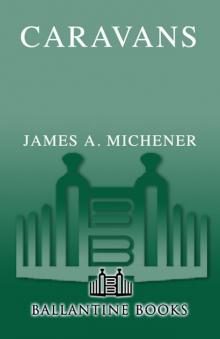 Caravans
Caravans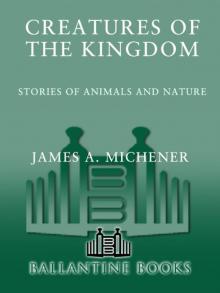 Creatures of the Kingdom: Stories of Animals and Nature
Creatures of the Kingdom: Stories of Animals and Nature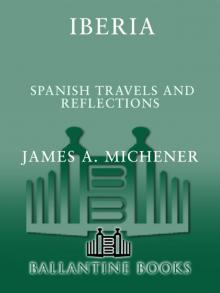 Iberia
Iberia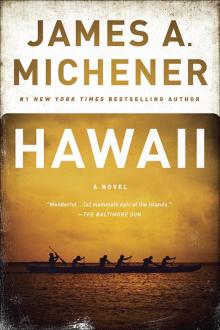 Hawaii
Hawaii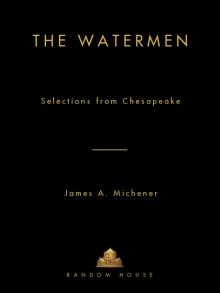 The Watermen: Selections From Chesapeake
The Watermen: Selections From Chesapeake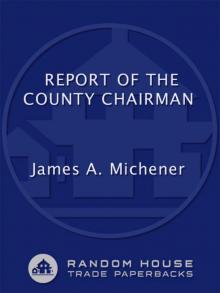 Report of the County Chairman
Report of the County Chairman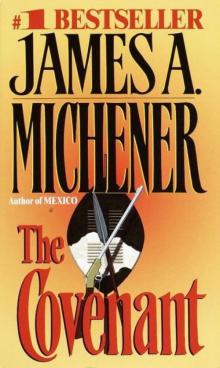 The Covenant
The Covenant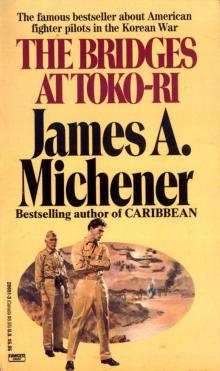 The Bridges at Toko-ri
The Bridges at Toko-ri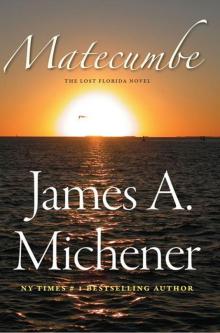 Matecumbe
Matecumbe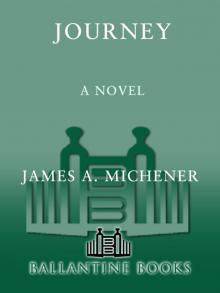 Journey: A Novel
Journey: A Novel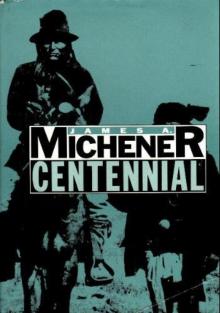 Centennial
Centennial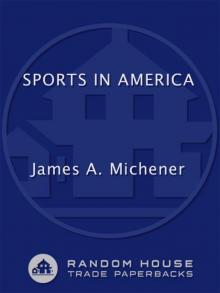 Sports in America
Sports in America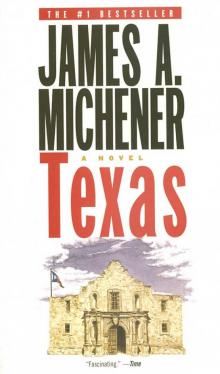 Texas
Texas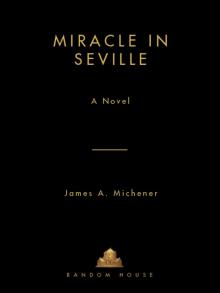 Miracle in Seville
Miracle in Seville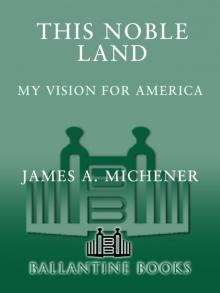 This Noble Land: My Vision for America
This Noble Land: My Vision for America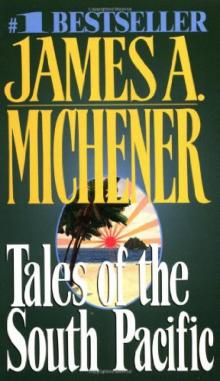 Tales of the South Pacific
Tales of the South Pacific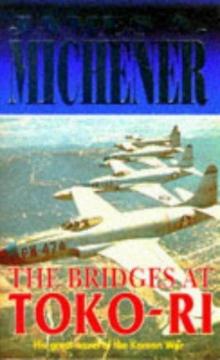 Bridges at Toko-Ri
Bridges at Toko-Ri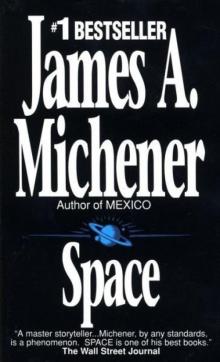 Space: A Novel
Space: A Novel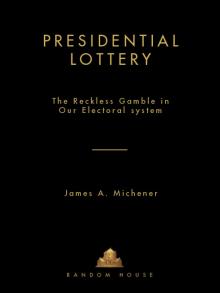 Presidential Lottery
Presidential Lottery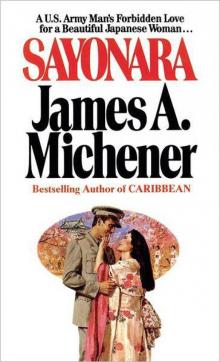 Sayonara: A Novel
Sayonara: A Novel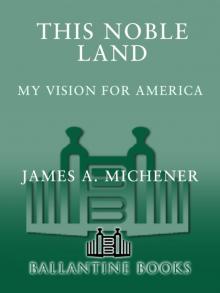 This Noble Land
This Noble Land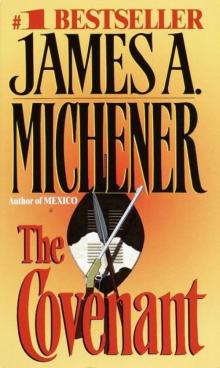 The Covenant: A Novel
The Covenant: A Novel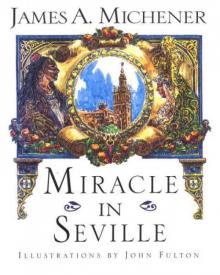 Miracle in Seville: A Novel
Miracle in Seville: A Novel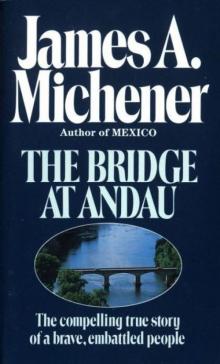 The Bridge at Andau
The Bridge at Andau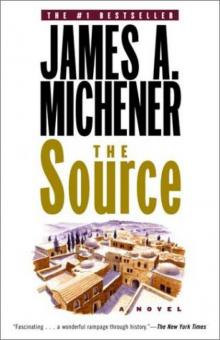 Source
Source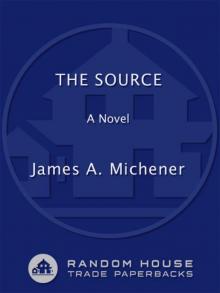 The Source: A Novel
The Source: A Novel Journey
Journey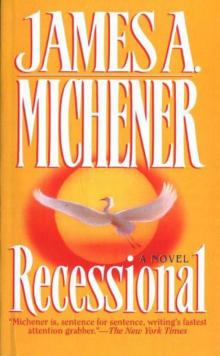 Recessional: A Novel
Recessional: A Novel Legacy: A Novel
Legacy: A Novel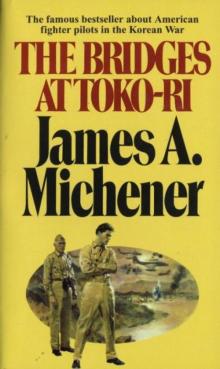 The Bridges at Toko-Ri: A Novel
The Bridges at Toko-Ri: A Novel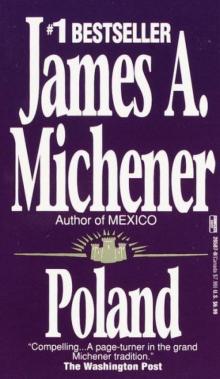 Poland: A Novel
Poland: A Novel